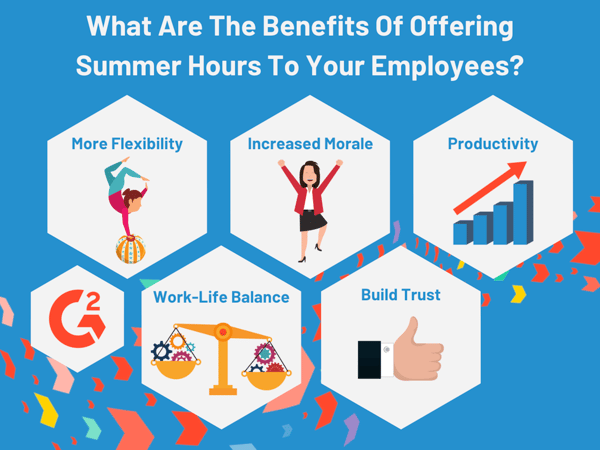July 8, 2019
 by Masooma Memon / July 8, 2019
by Masooma Memon / July 8, 2019

Summer vacation isn’t just for kids anymore.
If you’ve been keeping up with the latest HR trends recently, you’ve probably become familiar with the concept of summer hours. Summer hours are a new type of employee benefit aimed to attract and retain top talent. But what are summer hours and how can it help your company?
In childhood, summer hours were synonymous with trips to beaches, backyard BBQs, and roasting marshmallows. As adults, summer is comprised of the same old computer beeps and deep dives into documents.
The only catch? It turns out that summers aren’t very productivity-friendly. Studies reveal that productivity goes down by 20% during the summer months with projects taking 13% longer to complete as employees aren’t very focused. Workers also tend to be 45% more distracted during this time.
So with productivity, concentration, and the time taken to complete work all sinking, should you pause all business activities and resume anew when autumn arrives? Alas, that’s not what a business owner can afford. However, there is a middle ground present, and it comes under the name of summer hours.
|
Looking for specific information about summer hours? Click the links below to jump ahead: |
Summer hours are known by a variety of different names; summer hours, summer Fridays, etc. Though the names may be different, the concept stays the same.
Summer hours are an employee benefit offered to employees to reduce the amount of time spent in the office during the summer months.
The aim of summer hours is to reduce the total amount of time spent in the office during summer or reduce the total number of hours worked. These summer special schedules generally commence after Memorial Day and end with Labor Day.
Some employers, like career advice and job search site Career Contessa, choose to allow employees to work an extra hour Monday through Thursday in exchange for leaving early on Friday. In other cases, employers simply give their employees a half-day on Fridays or adjust office hours so that your team works from Monday to Thursday only.
What makes summer hours so appealing to employers is the ability to create a summer hours program that works for their unique business situation.
Now that it’s clear what summer hours are, an obvious question looming over our heads is, can your business afford to offer such flexibility to employees? Certainly.

Those are just a few of the benefits of summer hours. Here are seven benefits to offering summer hours or summer Fridays to your employees:
Summer is a tricky time when it comes to workplace productivity. It’s a popular time for employees to take vacations, visit family, and generally be absent from the office. All that plus the lure of skipping work to enjoy nice weather makes summer a less than productive time.
Offering summer hours to your employees allows them the opportunity to schedule their work around planned vacations and time away from the office. As productivity dips and projects take longer to complete, providing incentives to employees helps encourage them to get their work done. Employees are also more likely to front-load their work week if the promise of summer hours is on the horizon.
When the weather is nice outside, your employees are likely to feel demotivated trapped in their cubicles. Summer hours are the perfect way to boost employee morale during the middle of the year slump. It gives them something to work toward and look forward to at the end of a long week.
Increased employee morale translates into increased employee satisfaction. The CEO of Ivy Exec, Elena Bajic, agrees:
“We noticed an increase [in] employee morale and all the good things that go with that, such as higher retention, candidate attraction, and productivity” after offering summer hours.
All of these things work together to improve the employee experience. High employee morale culminates in higher self-esteem and better collaboration among teammates. All these pointers are excellent for your employees, as well as business.
A weather-based flexible timetable makes employees happy and focused. But, did you know that happy people tend to be 12% more productive as well? That’s a win-win for your employees as well as the organization.
With the increased focus, employees can get more work done. It’s easy to suspect remote work on Fridays or the day off as a negative productivity influencer. Opinion Research Corporation’s study suggests otherwise though. It found that 66% of employees who enjoy summer hour perks are more productive. So here’s to another merit of summer hours for your team.
It doesn’t take a scientific study to recognize that employees suffering from a poor work-life balance resent their jobs. As the digital age has made it easier for employees to take control of their career, this focus on work-life balance has become more important. Gallup’s State of American Workplace report highlights that 53% of employees rank work-life balance as “very important” to them.
One way to encourage your employees to strike a balance in their work and personal time is by offering a flexible summer schedule. By allowing your employees a more flexible summer schedule, employees will be free to plan vacations, enjoy more time with their kids, and embrace a healthier work-life balance overall.
Let’s admit it, failing to get work done due to the heat or overworking, and an inability to vacation with their kids can quickly leave your employees stress-busted. In this regard, it’s only wise to take preventative steps to limit stress in your workplace.
Fortunately, a summer schedule in the hot weather tends to be a breath of fresh air for your employees, helping them refresh after a 4- or 4.5-day work week. Employees can also choose to head out to a 3-day vacation if their Fridays are off, which helps ease their stress.
Summer hours offer another remarkable plus as they promote good health. All that work and no play can quickly take a toll on your staff’s health. As an employer it is your responsibility to provide a healthy and prevent a hostile work environment to your workers.
According to Senior Director of Research at the Families and Work Institution, Ken Matos, “The simple reality is that work, both mental and physical, results in fatigue that limits the cognitive and bodily resources people have to put towards their work.”
Allowing your employees extra time to take a mental health day or simply stay home if they’re not feeling well can prove beneficial in the long-run. Not only will you likely save money on corporate healthcare costs, you're likely to see increased employee engagement.
Arguably, the most important perk of summer hours is that it indicates to your employees that you trust them. Summer hours signals to your employees that you trust them enough to handle all the pending work within their flexible work hours, while also enjoying a little fun in the sun
The CEO and Co-Founder of the sock company Bombas, David Heath is of the same opinion.
“Our policy is basically that if you need to leave early to get somewhere, you come in early to finish your work or make sure all of your responsibilities are handled before you leave. It shows your team that you trust them to handle their own responsibilities.”
When implemented correctly, summer hours can boost your employees’ productivity, morale, and loyalty while reducing absenteeism. This can all be achieved without impacting the volume work produced by your employees. It’s a win-win for anyone looking to score brownie points with their employees, while maintaining profits.
Now that you know why you should create a summer hours program, it’s time to learn how to create one yourself. While a summer schedule comes in the company of multiple benefits, you’ll need to implement it right away to make the most of it. Consider your business goals and objectives, workflow, and other factors before chalking out flexible work hours.
|
Here are some things you should consider when creating a summer hours program:
|
One of the first obstacles you’ll need to tackle is how to track your summer hours program. Whether your employees are full-time, part-time, or temps, you’ll need an effective way to ensure everyone is working the hours they agreed to in order to participate in your summer hours program.
The right workforce management software can help make or break your summer hours program. It enables HR managers to create and assign employee schedules, track attendance, and report on workforce efficiency.
Workforce management software centralizes all of your vacation requests, employee schedules, and vacation tracking in a single location. This will help your company provide a clear picture of the success of your summer hours program.
|
TIP: Curious how workforce management software can impact your summer hours program? |
Summer hours are pretty beneficial for your employees. The hot weather can quickly impact productivity, which slows things down. Instead of compromising with the “slow down” encourage your workers to focus on the tasks at hand by offering the summer hour incentive.
Masooma Memon is a pizza-loving freelance writer by day and a novel nerd by night. She crafts research-backed, actionable blog posts for SaaS and marketing brands that aim to employ quality content to educate and engage with their audience. You can read her freelance work on her website, Ink & Copy.
Hybrid models are the future of the workplace.
 by Annabel Benjamin
by Annabel Benjamin
Are you offering enough to keep your employees engaged?
 by Lauren Pope
by Lauren Pope
Summer Fridays are a seasonal employee perk being offered by more companies who want to make...
 by Phil Norton
by Phil Norton
Hybrid models are the future of the workplace.
 by Annabel Benjamin
by Annabel Benjamin
Are you offering enough to keep your employees engaged?
 by Lauren Pope
by Lauren Pope


